The Secret History of English Spas (Bodleian Publishing, 2021)
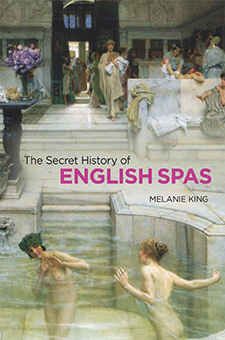
English spas have a long and steamy history, from the thermal baths of Aquae Sulis in Bath to the stews of Southwark, the elegant pump rooms of Cheltenham and Buxton to the Victorian mania for hydrotherapy and Turkish hammams.
The Secret History of English Spas is an informative but light-hearted social and cultural history of our obsession with drinking and bathing in spa waters. It tells the stories of the rich, the famous, the poor and the sick, all of whom visited spas in hopes of curing everything from infertility to leprosy and gonorrhoea. It depicts the entrepreneurs who promoted these resorts—often on the basis of the most dubious scientific evidence—and the riotous and salacious social life enjoyed in spa towns, where moral health might suffer even as bodies were cleansed and purged.
And yet English spas also offered an ideal of civility and politeness, providing a place where social classes and sexes could mingle and enjoy refined entertainments such as music and dance—all part of the fashionable pastime referred to as ‘taking the waters’.
Buy the book at Amazon.uk, Amazon.com, Barnes & Noble, The Bodleian Shop, Bookshop.org, Foyles, Indigo
The Lady is a Spy: The Tangled Lives of Stan Harding & Marguerite Harrison (Ashgrove Publishing, 2019)
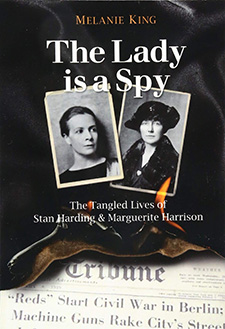
Mention female spies, and most people think of Mata Hari. But during the Roaring Twenties, Marguerite Harrison and Stan Harding were the cause célèbre: two beautiful, accomplished women whose names were splashed across newspapers around the world. Almost a century later, it is easy to understand the fascination with these two remarkable women. Marguerite was a highly respectable and recently widowed American journalist and socialite from Baltimore; Stan was a runaway, a bohemian artist and dancer of British heritage who left her wealthy, religious family to make a life for herself in the expatriate community in Florence. The two women were very different, yet both were strong-willed, independent and highly ambitious women unafraid of taking risks. And both, as the Great War ended and Central Europe dissolved into violent chaos, were looking for adventure.
Their paths first crossed in war-ravaged Berlin during the Armistice and the the Spartacist Uprising in 1919. Fellow travellers, they became friends and, the evidence suggests, lovers. Dodging bullets and interviewing colourful characters in war-torn Europe led these intrepid women, separately, to Bolshevik Russia, a country closed to outsiders since the October Revolution of 1917. Their fateful meeting had repercussions that spanned three decades, involving heads of state and politicians in Britain, the United States and Soviet Russia.
The Lady is a Spy tells their forgotten story: that of two women who, far in advance of their time, worked as foreign correspondents, who operated as spies in dangerous shadowlands of international politics, and who were both imprisoned in Lubyanka, one of the most desperate places on earth. Their lives are reconstructed through numerous primary sources, not only the poems, diaries and letters of their friends and lovers, but also government documents (including newly declassified US State Department papers) that reveal the truth about their espionage careers and—in one case—evidence of a shocking betrayal.
Buy the book on Amazon.com (also available as an ebook) and Amazon.co.uk (ebook).
Read Melanie’s guest blog on VisualisingChina.net: Melanie King on Harold Ivan Harding
Tea, Coffee & Chocolate: How We Fell in Love with Caffeine (Bodleian Publishing, 2015)
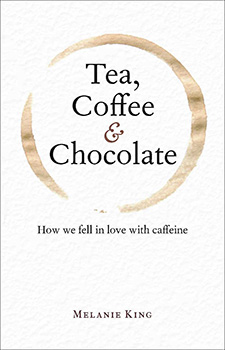
Did you know that coffee was recommended as protection against the bubonic plague in the seventeenth century? Or that tea was believed to make men ‘unfit to do their business’ and blamed for women becoming unattractive? On the other hand, a cup of chocolate was supposed to have exactly the opposite effect on the drinker’s sex life and physical appearance.
These three beverages arrived in England in the 1650s from faraway, exotic places: tea from China, coffee from the Middle East and chocolate from Mesoamerica. Physicians, diarists and politicians were quick to comment on their supposed benefits and alleged harmfulness, using newspapers, pamphlets and handbills both to promote and denounce their sudden popularity. Others seized the opportunity to serve the growing appetite for these newly discovered drinks by setting up coffee houses or encouraging one-upmanship in increasingly elaborate tea-drinking rituals.
How did the rowdy and often comical initial reception of these drinks form the roots of today’s enduring caffeine culture? From the tale of the goatherd whose animals became frisky on coffee berries to a duchess with a goblet of poisoned chocolate, this book, illustrated with eighteenth century satirical cartoons and early advertisements, tells the extraordinary story of our favourite hot drinks.
Buy the book on Amazon.com and Amazon.co.uk.
Read an excerpt: “A brief history of how we fell in love with caffeine and chocolate” (from the BBC’s History Extra)
Secrets in a Dead Fish: The Spying Game in the First World War (Bodleian Publishing, 2014)
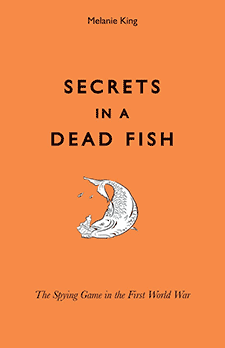
How did German intelligence agents use a dead fish to convey critical information to their operatives? What did an advertisement for a dog in the Times have to do with the movement of British troops into Egypt? And why did British officers suddenly become suspicious of the trousers hanging on a Belgian woman’s washing line?
Throughout World War I, spymasters and their networks of secret agents developed many clever—and sometimes comical—methods of covert communication. Stacks of bread in a bakery window, puffs of smoke from a chimney, and even woolen pullovers were all used to pass on secret messages that were decipherable only to the well-trained eye. Drawing on the memoirs of eight spies, Melanie King divulges these and other tricks of the trade while sharing details from their astonishing stories. Among her informants are British intelligence officers working undercover in Germany and France, including a former Metropolitan police officer who once hunted Jack the Ripper; a German secret service officer codenamed “Agricola;” an American newspaperman; and an Austrian agent who disguised himself during his career as everything from a Jewish peddler to a Russian officer.
A fascinating compendium of clever and long-forgotten ruses—interspersed with the stories of the spies themselves—Secrets in a Dead Fish sheds new light on the shadowy world of Great War espionage.
Buy the book on Amazon.com and Amazon.co.uk.
Read an article by Melanie King: Thanks for the spycraft, World War I: The fight that launched an explosion of espionage innovation (Boston Globe)
Reviews: The Spectator and Oxford Mail
Can Onions Cure Ear-ache? Medical Advice from 1769
from an original text by William Buchan
Edited by Melanie King (Bodleian Publishing, 2012)
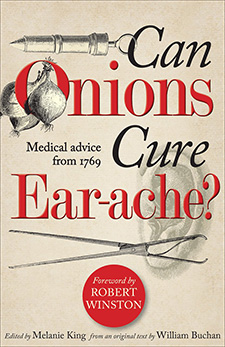
What common condition can be treated with cow dung? How do crushed oystershells ease heartburn? Can eels cure deafness? And how do you stop a stubborn case of the hiccups?
If someone was struck down by illness or injury in the late eighteenth century, the chances are that they would have referred to William Buchan’s Domestic Medicine—with the result that they might have found themselves drinking a broth made from sheep brain or administering drops of urine in their ears.
The book’s author, a Scottish physician, published his self-help manual in 1769 specifically for the benefit of those without access to affordable medicine. Copies could be found in coffee-houses, apothecary shops and private households, and in 1789 Fletcher Christian and his fellow mutineers took the sensible precaution of grabbing the copy from HMS Bounty as they fled to the Pitcairn Islands.
Some of Dr Buchan’s advice on how to live a healthy life and avoid disease is still sound and relevant today, such as eating a varied and healthy diet, breathing plenty of fresh air, and taking exercise. Several of his prescriptions, such as his fondness for powdered Spanish fly and genital trusses, are barmy. A few of his recommendations—bleeding a woman experiencing a difficult childbirth or administering mercury to treat numerous ailments—were downright dangerous. This edited selection of entries from one of the first medical self-help manuals gives a fascinating insight into popular treatments of the eighteenth century, derived both from folklore and the emerging medical science of the day.
Buy the book on Amazon.com and Amazon.co.uk.
Prophets, Seers and Visionaries (Quercus, 2009)
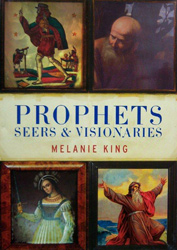
Melanie King offers entertaining, readable and richly informative profiles of 50 prophets, seers and charlatans of all types and from all periods. As well as telling their extraordinary life stories—and describing their sometimes even more extraordinary beliefs—she looks at why prophets and their prophecies are still attracting followers in the twenty-first century.
Those who foretell the future under divine inspiration, or who claim to be authentic interpreters of the will of God, have appeared in every era. Some prophets, such as Moses, Abraham, Jesus, Muhammad, are revered by millions as patriarchs or founders of major religions. Others, including such charismatic cult leaders as Joseph Smith Jr, founder of the Mormon Church, preach beliefs that lie somewhat outside the religious mainstream. Others yet—the likes of the almanack-writing prophet Nostradamus, the spiritualist Madame Blavatsky, the US psychic Edgar Cayce, and the contemporary doom-monger Marshall Herff Applewhite—have often been characterized as crackpots at best and fraudsters at worst.
Buy the book on Amazon.com and Amazon.co.uk.
The Dying Game: A Curious History of Death (Oneworld, 2008)
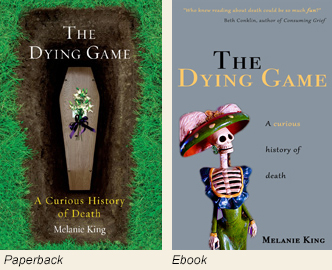
Would you like to be buried, burned, sunk, or pickled? Perhaps you’d prefer to be turned into a diamond, embalmed like Lenin, or shot into space like Star Trek’s Scotty?
The Dying Game is a roller-coaster history of everything that has, could, and befall a corpse—from the bizarre and grisly death rituals of ancient and modern cultures, to the morbidly fascinating biological, ethical, and legal story that begins only when we end.
A brilliant book of the dead that’s as gruesomely entertaining as it is exhaustively informative. King’s adventure into the world of this uniquely human obsession lifts the lid on everything you never knew (and didn’t know you wanted to know) about the last taboo: Death.
Buy the book on Amazon.com (also available as an ebook) and Amazon.co.uk (ebook).
Read an article from the Guardian on-line: “The digital gravestone: Human beings have always harnessed the latest technology to invent news ways of memorialising each other”
Surviving Stress at Work: Understand it, overcome it (Trafford, 2005)
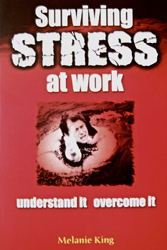
The latest statistics show that 1.2 million Britons suffer from work-related stress and that absenteeism due to stress costs the UK 1.2 billion per year. If you are part of this epidemic—if you have lost enthusiasm for your job, if you feel unable to cope with your workload, if you come home from work exhausted and tearful—then Surviving Stress at Work can come to your rescue.
Melanie King explains why prolonged stress is dangerous for your health, who is most susceptible, and what are the most common causes. She then offers positive strategies legal, medical and ‘spiritual’ to help stressed-out workers. King’s book is vital for those who think their work is making them ill and want to do something about it.
Buy the book on Amazon.com and Amazon.co.uk
